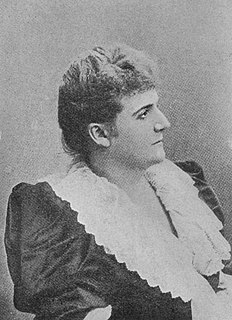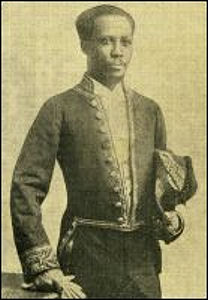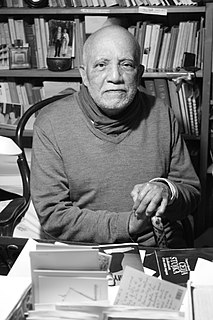"L'Abidjanaise" is the national anthem of Ivory Coast. Adopted under law n°60–207 on 27 July 1960, its status as national anthem is enshrined in the constitution's 29th article. It takes the form of a lyric and very patriotic poem, invoking inspiring imagery expressing the greatness of the Ivorian soil and values such as hope, peace, dignity, and the "true brotherhood".

The Rassemblement pour l'Indépendance Nationale was a political organization dedicated to the promotion of Quebec national independence from Canada.

Artibonite is one of the ten departments of Haiti. With an area of 4,887 km2 it is Haiti's largest department. As of 2015, its estimated population was 1,727,524. The region is the country's main rice-growing area. The main cities are Gonaïves and Saint-Marc. In February 2004 an insurgency tried unsuccessfully to declare Artibonite's independence.

Augusta Holmès was a French composer of Irish descent. At first she published under the pseudonym Hermann Zenta. In 1871, Holmès became a French citizen and added the accent to her last name. She herself wrote the lyrics to almost all her songs and oratorios, as well as the libretto of her opera La Montagne Noire and the programmatic poems for her symphonic poems including Irlande and Andromède.
Se Canta is an anthem associated with Occitania. It is also a very old popular song, known all over Occitania. According to legend, it was written by Gaston III Fébus (1331–1391), Count of Foix and Béarn.

Les oiseaux du bonheur is the second French-language compilation album by Canadian singer Celine Dion, released in France in 1984. It is also her second album released in France. It includes mainly songs from Mélanie, which was released in Quebec, Canada in 1984.
André d'Allemagne was a translator, political science teacher, essayist and a militant for the independence of Quebec from Canada. Along with some 20 other people including Marcel Chaput and Jacques Bellemare, he was a founding member of the Rassemblement pour l'indépendance nationale (RIN).
Andrée Ferretti is a Canadian political figure and author. She was the vice president of the Rassemblement pour l'indépendance nationale (RIN), a Quebec independence movement and later political party of the 1960s. Ferretti was one of the early militants of the contemporary Quebec independence movement.
Juste Chanlatte, Comte de Rosier (1766–1828) was a Haitian editor, journalist, poet, playwright and a count. He served as secretary to King Henri I of the Kingdom of Haiti with the noble title of Comte de Rosier. Chanlatte was born in Port-au-Prince and educated in France. He wrote for La Gazette du Cap and later was the editor of the official government publication under President Jean-Pierre Boyer, le Télégraphe.
Antoine Dupré (1782–1816) was an early Haitian poet and playwright. He was one of the first published poets and one of the first performed playwrights of independent Haiti. He is known for his historical works, such as the poems Hymne à la Liberté and Le Rêve d'un Haytien, and the plays La Mort du Général Lamarre and La Jeune Fille. Dupré was killed in a duel at about 34 years of age.

Massillon Coicou was a Haitian poet, novelist, playwright, and politician. Born in Port-au-Prince, Coicou was educated in a Catholic school for boys. He was appointed as the Haitian Chargé d'Affaires Étrangères for the Haitian Republic in France, where several of his works were published. Opposed to the presidency of Pierre Nord Alexis, Coicou publicly announced his intentions to overthrow Nord Alexis' government. He and his two brothers were subsequently executed by the President's orders on the night of 14–15 March 1908.

René Depestre is a Haitian poet and former communist activist. He is considered to be one of the most prominent figures in Haitian literature. He lived in Cuba as an exile from the Duvalier regime for many years and was a founder of the Casa de las Americas publishing house. He is best known for his poetry.
Gérard Mentor Laurent was a Haitian historian and educator. Some of his most notable works are Coup d'Oeil sur la Politique de Toussaint Louverture (1945), Six Etudes sur J. J. Dessalines (1951), Pages d'Histoire d'Haïti (1960), Le Commissaire Sonthonax à Saint-Domingue, and Haiti et l'Indépendance Américaine (1976).

"Hymne à l'amour" is a popular French song originally performed by Édith Piaf.

Trois mélodies is a set of mélodies for solo voice and piano, by Gabriel Fauré. It is composed of "Après un rêve", one of Faure's most popular vocal pieces, "Hymne", and "Barcarolle". The songs were written between 1870 and 1877, and published in 1878. They were not, however, originally conceived together as a set of three; the opus number 7 was imposed on them retrospectively in the 1890s, almost 20 years after their first publications.
Independence Day in the Republic of Niger is commemorated on August 3, marking the nation's independence from France in 1960. Since 1975, it is also Arbor Day, as trees are planted across the nation to aid the fight against desertification.
"La Venoge" is a poem written by Jean Villard Gilles who also wrote the popular song Les trois cloches. It refers to the River Venoge that flows in the Canton of Vaud, Switzerland to Lake Léman. The poem, which is a vibrant and humorous homage to the author's canton, inspired Jacques Brel for his famous song Le Plat Pays.

The historiography of Haitian cinema is very limited. It consists only one double issue of the journal of the French Institute of Haiti Conjonction, released in 1983, devoted to film; a book by Arnold Antonin, published during the same year, entitled Matériel pour une préhistoire du cinéma haïtien ; and an article by the same author in the 1981 book Cinéma de l’Amérique latine by Guy Hennebel and Alfonso Gumucio Dagrón.
Alfred Auguste Nemours was a Haitian General, diplomat and military historian.
Jean-François-Maxime Raybaud was a French philhellene officer and writer, and a participant in the War of Independence of Greece.












